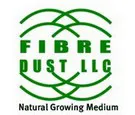With a history of only 25 years, coco is a relatively new product in the horticultural industry. Its popularity has been on a continuous rise and is expected to keep on growing over the next couple of years. “The European growing industry was very peat minded, but this has changed. Nowadays peat and coco are fully compliant raw materials being used in the production of potting soil”, Geerten van Eldik with Fibredust tells us. That’s why the company recently joined Growing Media Europe – the first coco producer to do so.
The global substrate market is always on the move. Since its introduction, over 20 years ago, coir has gained ground rapidly in North, Central and South America, as well as Asia. Making it possible for growers to start hydroponic cultivation in an affordable way, and therefore offering higher yield levels and the possibility to avoid diseases while still mono cropping, the use of coco grew alongside the use of hydroponics. In Europe, the rise of coir hasn’t been as mad, as many growers were already familiar with substrate growing when coco entered the industry.
“Currently about 12.5% of global growing media being used is coir, as researched by Wageningen UR and RHP”, Geerten continues. This percentage is expected to grow further. Wageningen UR researcher Chris Blok estimates the amount of coco being used, currently 5 million m3, might even multiply by seven over the next couple of years. With both the production and the use of peat being limited more and more, an alternative is needed. And coco could be it.” Nowadays soft fruit is changing the industry. “In America, the market for coco slabs is growing thanks to the popularity of the product in crops such as soft fruit and cannabis. In Europe, bulk is key and since peat is a complete raw material, it's of good use in this industry. The use of slabs could grow in the next couple of years, but nowadays we see coir is being used as an alternative to peat in the mix of potting soils”, Geerten explains."
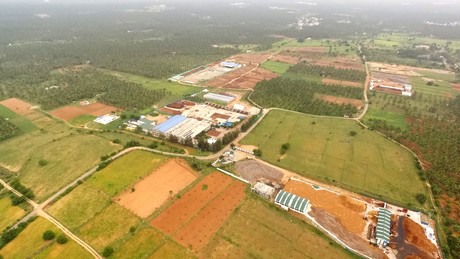 FibreDust India production location Anar Coir. About 40 hectare drying and processing facilities.
FibreDust India production location Anar Coir. About 40 hectare drying and processing facilities.
 Team Fibre Dust India - Anar Coir - visited by Geerten
Team Fibre Dust India - Anar Coir - visited by Geerten
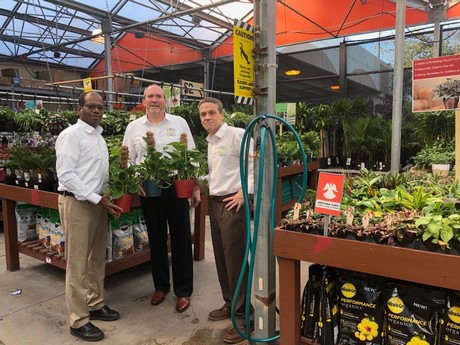 The USA sales team
The USA sales team
Challenges
Being a reusable product, a product of nature and an easy to use substrate, coco is favored by more and more growers. However, coco is facing challenges as well. As a product of nature, the residual product from the coconut growing industry, coir had to deal with supplying issues due to climate circumstances in production regions in India and Sri Lanka.
By spreading their production over various Indian and Sri Lankan facilities and investing in the production chain, Fibredust has been able to solve the issues and secure their supply for the future. “Drying the raw material is an important topic. We’re testing this thoroughly and are nearly there, but it’s a complicated matter: you do not want to adjust the internal quality of the material. We’re looking for the perfect way to ensure our buffering quality whilst maximizing the output and keeping an eye out on the energy costs.” In the production chain, water and transport are also of concern. “With a special system we collect a lot of rainwater, which can be used in the process. By using a reverse osmosis system, we are able to re-use the water and since the buffering process is optimised, we can buffer large amounts of peat in a short time. With investments like these we want to keep investing in the sustainability of the industry. We expect this will result in an RHP certificate in 2019 as well.”
 "The USA sales team
"The USA sales team
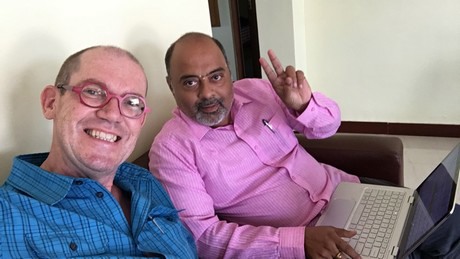 Geerten with Satheesh Rao,
Geerten with Satheesh Rao,
Coco is bought based on trust
“Coco is bought based on trust”, Geerten continues. “On the outside, you cannot see if a product is good or bad, and since the delivery time is four weeks, the problems are big when there’s something wrong with the product. That’s why to us, trust in the company is valued highly.” Certificates like SA8000 and ISO14000, ISO9001 and OMRO are examples of this – but there’s more. This year Fibredust joined Growing Media Europe, the body representing the growing media industry and known for being a rockwool-peat organization.
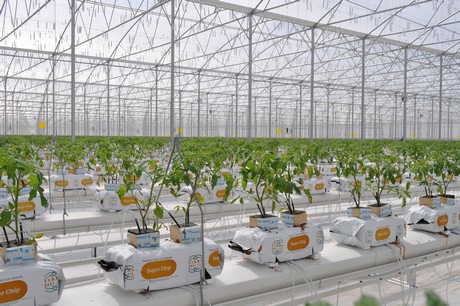
“The European growing industry was very peat-minded, and peat and coco were even competing, but this has changed. Peat and coco are fully compliant as raw materials being used in the production of potting soil, and the choice is for the grower to make.” With the importance of coco growing, the interests of the coco industry have grown as well. “The industry needs to be represented”, says Geerten.
For example, the import of coco material into Europe has attracted interest from the European Commission. “With coco being officially a plant waste, it was said every consignment had to be tested separately before it could be imported. With thousands of containers being imported, that would be an immense setback. Thanks to the effort made by the coco industry and the network and support of Growing Media Europe, this plan was torpedoed. We’re proud to be a part of this. Of course we’re Fibredust and are a commercial company, but the major issues of the industry concern us as well. If the industry flourishes, we flourish as well.”
